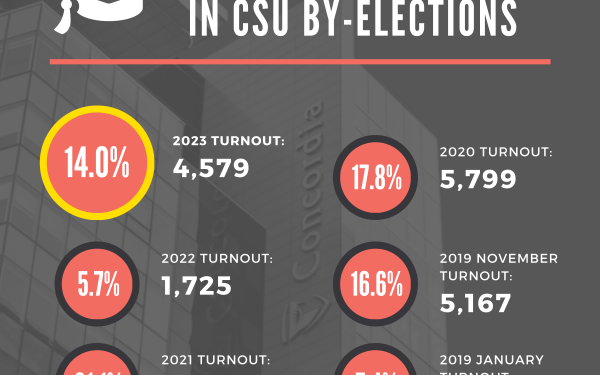Editorial: All for None, None for All
At the Feb. 12 Concordia Student Union meeting, two petitions were presented by John Molson School of Business councillor Michael Richardson that would see the fee levy system at Concordia dramatically restructured.
The first question sought to have business undergrads opt out of funding fee levy organizations including Le Frigo Vert, the Art Matters Festival and Cinema Politica. The second question mandated that future funding of fee levy groups should be decided on a per-faculty basis, essentially allowing entire faculties to opt out of funding certain organizations.
Concordia Student Union chief electoral officer Andre-Marcel Baril ruled that the first question was illegitimate and therefore could not continue to referendum vote. Unless this ruling is contested, this question will not appear on the ballot. The second question, however, will show up on the ballot in this spring’s CSU general elections in some form.
If the question passes—it needs a “yes” from a majority of voters to do so—the very structure of how fee levy organizations get funding will be altered. If a faculty decides, through a vote, to discontinue funding a certain organization, that organization will lose an important part of the funds that they depend on.
How much will individual students gain in deciding to stop funding the organizations? In most cases a few cents per credit—the annual total less than a cup of coffee at Café X.
Fee levy groups are effective in their mandates because everyone gives a little to create something meaningful, something that provides important services—be it affordable food or access to thought-provoking documentaries—to a variety of students.
Fee levy groups should not be looked at as a financial drain, but rather as an important resource, a place where students can find employment, build their portfolios, meet like-minded individuals and gain insight into careers they may wish to pursue, all while attending university.
Automatically opting out every student in a single faculty could potentially cripple these groups and their ability to create budgets.
Faculties should not be conceived as monoliths made up of a single type of person; they’re made up of thousands of different people with different interests and needs.
The current process for opting out is not complicated, either. A Google search of the organization you don’t wish to fund, followed by the words “opt out,” reveals that most of the organizations detail exactly how to get your money back. If you really want a refund, you can get it. Without incentive to manually opt in, a de facto opt-out would leave students free-riding on a defunded group.
Students should be made more aware that these groups exist for their use—and have clear opt-out instructions—but allowing entire faculties to skip out on the bill is not the solution.
Just because a student refuses to peer outside the confines of their cozy building does not mean an entire organization should suffer. These groups, including this paper, rely on some of your pocket change each semester to make this community a little better.
Next month, students must decide if fee levies remain a service to all students, or if they get splintered by faculty. It’s a matter of whether we are stronger together, or apart—and whether the split is worth some change in your pocket.







